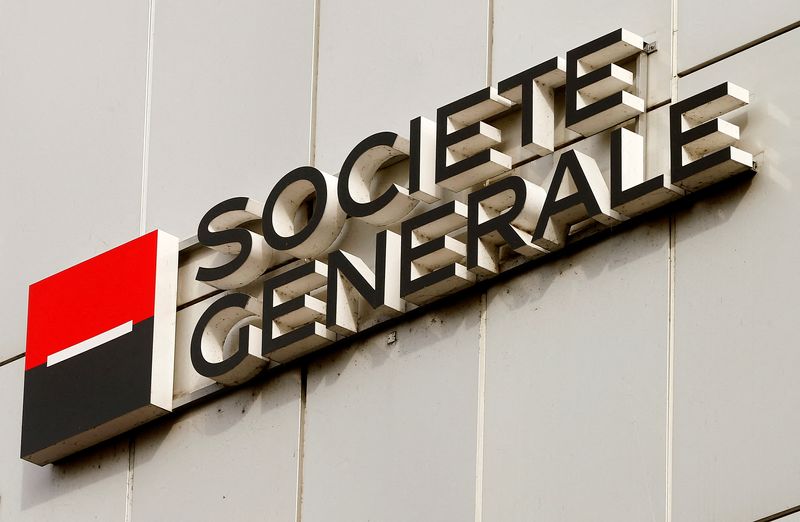By Tassilo Hummel
PARIS (Reuters) -French bank Societe Generale (OTC:SCGLY) said on Monday it would quit Russia and take a 3 billion euros ($3.3 billion) income hit from selling its Rosbank unit to Interros Capital, a firm linked to Russian oligarch Vladimir Potanin.
Rosbank will rejoin the business empire of Potanin, the 61-year-old head of mining giant Norilsk Nickel, who has been sanctioned by Canada https://www.international.gc.ca/world-monde/international_relations-relations_internationales/sanctions/russia_regulations-reglement_russie13.aspx?lang=eng under Western moves against Russia's business and political elite over its invasion of Ukraine.
He has not been sanctioned by the European Union or the United States.
While financial terms of the deal were not announced, SocGen said it would write off 3.1 billion euros, comprising a 2 billion-euro hit on Rosbank's book value and the rest linked to the reversal of rouble conversion reserves.
SocGen, the first major Western bank to announce its exit from Russia, had previously flagged the risk of a write-off on its 99% stake in Rosbank. Investors said its exit from Russia removed a lot of uncertainty.
It pledged to stick to plans for a dividend and a 915 million-euro share buyback.
Morningstar analyst Johann Scholtz noted SocGen shares rallied 7% on the news, even though Russia only accounted for about 2% of SocGen's earnings.
"It shows what discount the market was pricing in for potential Russian risks. This draws a line in the sand," he said.
SocGen "essentially gives the business away for free," Scholtz said, noting the book value writedown on Rosbank.
"The only way they can do that is that if they get no material consideration," he added.
Interros agreed, however, to pay off Rosbank's subordinated debt, approximately 500 million euros.
Overall, SocGen said the exit would shave 20 basis points (bps) from its Tier 1 capital ratio - the core measure of a bank's financial strength - which stood at 13.7% at the end of 2021 or 470 bps above the minimum required.
Citi analysts said the news was "a welcome surprise for the market, given the small capital impact and the reduction of future risk, as well as confirmation of dividend policy."
But the sale to Potanin was not universally applauded.
"It's a bit distressing that ultimately this is an enormous gift to one of the wealthiest oligarchs," said Jerome Legras, head of research at Axiom Alternative Investments.
France's finance ministry declined to comment when asked whether the government had a role in negotiations. It declined to comment on Potanin’s status as a sanctioned individual.
Russia's invasion of Ukraine, which Moscow describes as a "special operation," has prompted a wave of foreign companies to shutter their Russian businesses. Orchestrating a complete break is, however, more difficult due to sanctions and political sensitivities.
Axiom's Legras said SocGen's Russian exit put pressure on others to act. Italy's UniCredit and Austria's Raiffeisen are still considering their futures in Russia, while U.S. bank Citi is trying to offload a consumer banking franchise.
"The challenge in this environment is whom can you sell to? It's easier to sell at a deep discount or walk away when it's 2% of your earnings than if it is a third," Morningstar's Scholtz said, referring to Raiffeisen which earns almost 30% of net profits from Russia.
Asked whether SocGen's deal meant other companies could sell their assets to Russian buyers, Kremlin spokesman Dmitry Peskov said: "This depends on the decision of an owner of a specific company which is leaving Russia".
ORDERLY EXIT
SocGen said the deal would allow it to quit Russia in an "an effective and orderly manner" and ensure continuity for Rosbank's employees and clients.
Potanin's holding company had owned Rosbank from 1998, before SocGen bought a stake in 2006 and merged it with its other Russian operations in 2010. SocGen paid https://www.societegenerale.com/sites/default/files/pressrelase/06132gb.pdf $317 million for its initial 10% stake in Rosbank.
Potanin, Russia's second richest man with $27 billion worth of assets according to Forbes magazine estimates, worked in the Soviet Union's foreign trade ministry and later as a banker before establishing Interros in 1990, an umbrella for his assets which range from metals production to a ski resort.
During the 1990s, Potanin served as Russia’s first deputy Prime Minister, masterminding the first wave of privatisations of former state-owned and himself buying several large businesses, including a stake in mining giant Nornickel.
Following Moscow's invasion of Ukraine, which began on Feb. 24, Potanin said that confiscating assets from companies that had left Russia would shatter investor confidence for decades.
"The most important goal of Interros is to maintain the stability of Rosbank and create new opportunities for its clients and partners," Potanin said in a statement.
Interros said the Rosbank deal should be closed in the next few weeks after all necessary regulatory approvals.

French financial watchdog AMF declined to comment.
($1 = 0.9152 euros)